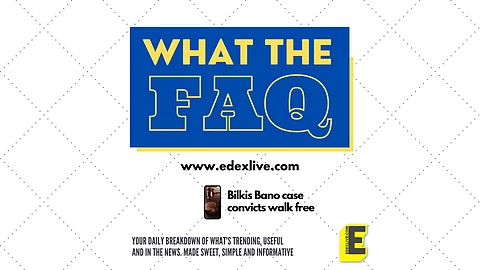

As India was celebrating the spirit of the country’s 75th Independence Day on Monday, August 15, the Gujarat government announced the release of 11 convicts who had attacked Bilkis Bano and her family in the aftermath of the Gujarat riots in 2002. A viral video was circulated online which showed the men lined up outside the Godhra jail as their relatives gave them sweets and touched their feet as a mark of respect.
But what happened in the case and on what basis were they released? What has been the reaction to it? More importantly, what is the remission policy that allowed them to walk out of jail?
What happened in this case? What punishments were served to the convicts?
Bilkis, her mother and three other women were gang-raped and seven members of her family, including her three-year-old daughter, were killed by a mob on March 3, 2002, in Limkheda taluka of Dahod district during the riots in Gujarat. The riots had erupted in the state after a train carrying Karsevaks and Hindu pilgrims from Ayodhya was burnt down in Godhra in February 2002. In the aftermath of the violence, Bilkis and her family had tried to escape their home to seek shelter, when the attack happened.
Among those who attacked them, 11 men were arrested in 2004 and a Special Central Bureau of Investigation (CBI) Court sentenced them to life imprisonment on the charges of conspiring to rape a pregnant woman, murder and unlawful assembly under the Indian Penal Code (IPC), according to media reports. Additionally, in 2017, the Bombay High Court upheld the conviction and life imprisonment of the accused in the gang rape case.
Why were the convicts released?
According to reports, it has been pointed out that one of the convicts in the case had approached the Gujarat High Court with a plea seeking remission (reducing the amount of sentence without changing the character) of the life sentence, which was initially dismissed. He then filed a plea in the Supreme Court, on the grounds that he was in jail for 15 years and four months without remission as of April 1, 2022. The court directed the Gujarat government to look into the issue of remission of his sentence. It then formed a committee that took a decision in favour of remission of all the 11 convicts in the case.
What is a remission policy?
Under the 1992 remission policy of Gujarat (which was stated in the Gujarat High Court order in 2012) convicts serving life sentences can be granted remission and released after they have served a minimum of fourteen years, as pointed out by reports. At the time when the crime was committed against Bilkis Bano, and during the conviction of the accused, this policy was in force. However, it was discarded by the Supreme Court in November 2012. The state government then formulated a new policy in 2014 based on the SC directions which introduced restrictions on the conditions on which remission can be granted.
Is there a row regarding the remission policy as well?
The move by the state government to release the convicts has invited widespread criticism from people, including journalists, lawyers and activists, some of whom, raised the question that the convicts were released under the older remission policy (1992) of the state and were not eligible for remission of sentence under the state government’s latest 2014 policy.
The new policy pointed out a list of cases such as those in which the prisoners were convicted for a crime that is investigated by the Central Bureau of Investigation and also, where prisoners were convicted for murder with rape or gang rape, wherein remission cannot be granted. These restrictions were not mentioned in the old policy. In this case, the convict applied for remission under the old policy itself
What were other reactions to the release of the convicts?
The opposition party Congress lashed out at the government and the Congress spokesperson Pawan Khera reportedly said that this decision brings out “BJP government’s mindset,” as stated in a report by PTI.
Additionally, a statement was issued by Advocate Shobha on behalf of Bilkis Bano which stated that, “The release of these convicts has taken from me my peace and shaken my faith in justice. My sorrow and my wavering faith is not for myself alone but for every woman who is struggling for justice in courts.” She also appealed to the state government in the statement to ensure her safety and of her family members post the release of the convicts.
Is this the first time convicts of heinous crimes are walking out of jail?
No, this is not the first time. In the horrific gang-rape incident in Delhi in 2012 that sparked national outrage, the youngest of the six people who were convicted in the case was released after the Delhi High Court refused to extend his three-year sentence (as he was a juvenile). Reports stated that under India's juvenile justice laws, the maximum punishment for a minor is three years at a reform facility.
In another high-profile murder case, Manu Sharma, son of a former Union Minister who shot dead Jessica Lal in 1999, was prematurely released from jail in 2020 after spending 17 years in jail, although his remission period was 23 years and four months.
